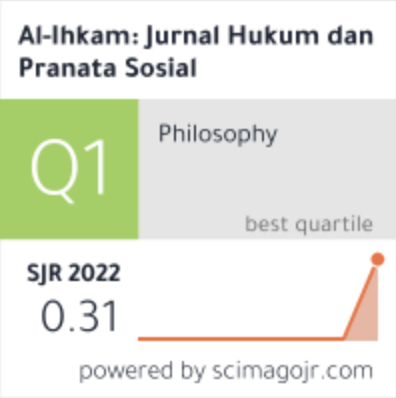MUHAMMAD SA’ID AL-‘ASHMAWI (Mencabar Pemikirannya tentang Penerapan Syarî’ah di Mesir)
 Abstract views: 204
,
Abstract views: 204
,
 PDF downloads: 324
PDF downloads: 324
Abstract
The rise of a vigorous and sometimes violent Islamist
movement in Egypt has attracted considerable attention
from scholars. Less attention has been given to those who
have responded to this challenge at the level of ideological
debate. One of these is a prominent judge, Muhammad Sa’id
al-‘Ashmawi. He argues that the call for the "application of
the syarî’ah" (tathbîq al-sharî’ah), watchwords of the Islamist
movement, are in reality little more than empty slogans,
designed to get popular support for a political venture but
extremely vague and probably insignificant in substance. In
time, however, its meaning expanded, first to include all of
the rules for worship and society found in the Qur’ân, then
those in the sunna of the Prophet, and finally all the opinions
and judgments of the scholars (ijtihâd). But these opinions
and judgments are properly called fiqh, and the final result of
the development is that in common usage the term syarî’ah
has come to mean fiqh.Those who use the slogan, however,
are in fact calling for the application oí fiqh, that is, a set of
rules and laws devised by humans, not God, to meet
historical conditions of the past which no longer obtain. In
discussing ribä, al-cAshmawi holds that current Egyptian
law essentially conforms to the syarî’ah. The same is true of
the rest of Egyptian law.
movement in Egypt has attracted considerable attention
from scholars. Less attention has been given to those who
have responded to this challenge at the level of ideological
debate. One of these is a prominent judge, Muhammad Sa’id
al-‘Ashmawi. He argues that the call for the "application of
the syarî’ah" (tathbîq al-sharî’ah), watchwords of the Islamist
movement, are in reality little more than empty slogans,
designed to get popular support for a political venture but
extremely vague and probably insignificant in substance. In
time, however, its meaning expanded, first to include all of
the rules for worship and society found in the Qur’ân, then
those in the sunna of the Prophet, and finally all the opinions
and judgments of the scholars (ijtihâd). But these opinions
and judgments are properly called fiqh, and the final result of
the development is that in common usage the term syarî’ah
has come to mean fiqh.Those who use the slogan, however,
are in fact calling for the application oí fiqh, that is, a set of
rules and laws devised by humans, not God, to meet
historical conditions of the past which no longer obtain. In
discussing ribä, al-cAshmawi holds that current Egyptian
law essentially conforms to the syarî’ah. The same is true of
the rest of Egyptian law.
Downloads
Download data is not yet available.
Published
2009-09-03
Issue
Section
Articles
In order to be accepted and published by Al-Ihkam: Jurnal Hukum dan Pranata Sosial, author(s) submitting the article manuscript should complete all the review stages. By submitting the manuscript, the author(s) agreed to the following terms:
- The copyright of received articles shall be assigned to Al-Ihkam: Jurnal Hukum dan Pranata Sosial as the publisher of the journal. The intended copyright includes the right to publish articles in various forms (including reprints). Al-Ihkam: Jurnal Hukum dan Pranata Sosial maintain the publishing rights to the published articles.
- Authors are permitted to disseminate published articles by sharing the link/DOI of the article at Al-Ihkam: Jurnal Hukum dan Pranata Sosial. Authors are allowed to use their articles for any legal purposes deemed necessary without written permission from Al-Ihkam: Jurnal Hukum dan Pranata Sosial with an acknowledgment of initial publication to this journal.
- Users/public use of this website will be licensed to CC-BY-SA.



.png)
_1.png)










